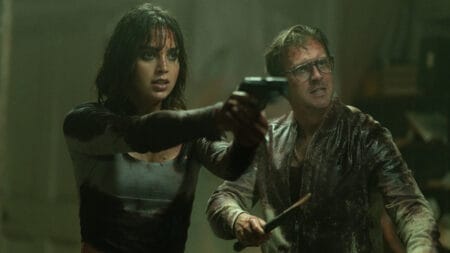From Star Trek to The Flash and Lucifer, Hanelle M. Culpepper has graced so many franchises within pop culture with her directing skills. Culpepper is known as a leading woman in the directing field with multiple awards to her name. The ability to interchange between directing for television and film is one which she has mastered, with a wide range of ongoing and upcoming projects under her belt. Specifically with television, anyone who has been an active viewer of today’s hit shows will recognize her name.
Star Trek: Picard had its successful series premier earlier this year. After so long, fans were finally treated to the return of Patrick Stewart’s Jean-Luc Picard from The Next Generation in a way that couldn’t have been more unprecedented. The series, exclusive to CBS All Access, has been ordered for two more seasons. Following her pivotal directorial work on Star Trek: Discovery, Culpepper returned to the widely beloved universe to direct and guide the first 3 out of 10 episodes of Star Trek: Picard‘s debut season.
We had the pleasure to sit down with Hanelle M. Culpepper for an exclusive interview! We reflect on her career and what it was like to be the first woman to launch a Star Trek series in its 53-year history. We also get an update on her upcoming feature, 1000 Miles.

To start off the interview, how have you been continuing to work during the COVID-19 lockdown?
HMC: There has been lots of development to do, so lots of reading scripts, books, and articles as well as pitch meetings and general meetings with executives. I also have had a little bit of extra time to do some of the prep stuff that I like to do for the shows that I’m going to shoot. I’ve been doing research for my features and stuff like that. I have not done that much writing, I thought I would do a lot more writing!
How did you get involved in Star Trek: Picard and were you a fan of any of the original TV series or films?
HMC: I got involved with Star Trek: Discovery. I was invited to do an episode in season one and had a really great time working with that team. So they had me come back and do another episode in season two and Alex Kurtzman loved that episode and that’s why he came to me about doing Picard. I’ve been a Star Trek fan for a while. The Next Generation was kind of my first, not my first introduction, but the first show that I actually watched as it was on the air every week. So yeah, I’ve been a fan for many years.
As you were saying, Star Trek is a cult classic and already has a really large fan base. How did you go about using previous source material in the series?
HMC: Well we researched, researched, researched! We actually had a list of episodes that we shared with the actors and crew. This list was collated by the executive producers and writers too, because they were the ones that most dealt with all the various themes and characters that we were using within the series. And so, we watched those but also surround yourself with a team of people who love and know Star Trek as much as, and even better than you. Then you have their vast knowledge to tap into as well. With every decision that we made, we were looking back and seeing what’s in canon, what’s been done before, what can we add a spin to – to update it or do we want to do exactly how they did it before because that would be a cool Easter egg for the fans? So you’re always referencing what’s come before, but you want to add your own spin to it.
Patrick Stewart stars in this series and reprises his role as Jean-Luc Picard. What was the collaboration process like between him and yourself?
HMC: He really knew where he wanted his character to be at this point and he had many discussions with the writers working that out because as most people know, he didn’t even want to be Picard again. He did not want to come and play Picard if he was going to be the same person. It was great that he wanted to acknowledge that he’s older, he’s had various experiences. He wanted to use the fact that he had some guilt from things that happened in his past and so it was great that he had all these really strong character ideas and thoughts. Collaborating with him was a matter of listening. As a director, it was important to create that safe space for him to do his thing and keep an eye out to give tweaks here and there. Sometimes it was things as small as intonation of voice. He was wonderful to collaborate with and I really enjoyed this version of Picard because it felt really honest.

The series features emotional character driven moments as well as plenty of actions that pieces. How do you go about balancing those elements from a directorial standpoint?
HMC: For me, the emotional character driven moments are as important as the actual set pieces, probably more. But the action set pieces obviously take a lot more time logistically to shoot. It’s a matter of how you schedule your day and making sure you get the time to get all the stuff that you want, but you don’t want to then end up rushing the actors through the scenes. So a lot of times it’s working with the AD to determine the order of the day or perhaps shifting stuff to other days so those emotional moments don’t get short shrift in the overall crazy shooting day
To switch gears, your latest project is a feature film titled 1000 Miles. Could you tell us a bit about that true story?
HMC: It’s the incredible true story of Ellen and William Craft, who were slaves who escaped and actually arrived in freedom on Christmas Day. They escaped as she was very light-skinned and so she dressed as a white man and her husband acted as her slave. They escaped by traveling on trains and in ships with the oppressor. So it is a very amazing study of race, gender, and class wrapped up in this incredible suspense drama that also deals with marriage dynamics.


You have directed multiple episodes of TV shows from Gotham to Lucifer as well as a number of features. Could you tell us a bit about the difference in the processes between directing the two mediums?
HMC: When you come into TV, you’re telling what essentially is a chapter in a book. You want your episode to fit with the rest of the series, but you still want to leave your stamp and elevate the script – bring in something special. Whereas with a feature it’s all your vision, what you’ve pitched to the producers or the studio and what they have agreed to do. So you have a lot more freedom in a way with all your decisions. Whereas with television, with the writers and the showrunner, you need to run certain decisions by those people. So even certain things like let’s say you want to do a long take for a scene in a feature, you just do it because that’s what you want to do. But with a TV show, you need to check with them and tell them that this is what you want and then see how they feel about it.
Sometimes they still want options so that they can cut. I think that’s also probably one of the main things with directing for TV versus for film. With TV, you have that time limit of the show must be 42 minutes or whatever it needs to be to air versus features where you don’t have that limit. You may sign something that says this will not be any longer than however many minutes, but still you have freedom within that. Whereas with TV you’re really trying to hit that mark. That also means that you may have to shoot a little bit more than you would have liked because they will need the choices in the editing room to make something go faster or slower. But otherwise, for me, beyond that, it’s kind of the same. I’m a story and character driven director that drives my style and my choices. I bring that to my TV episodes and to my features.
As an accomplished woman in the film industry, do you have any advice for women who aspire to become directors and break into the industry?
HMC: Yes! Don’t give up and keep trying. It can take years, but if you remain positive and during that time continue to improve your craft so that when you get that break, you’re ready to grab it and fly. That would be one of my main pieces of advice and then otherwise keep directing, make a short web series or even make a feature if you can. Just keep working on your craft, attend seminars, take acting classes – do all this so that you’re ready when that opportunity arrives.
Just to loop back there, how did you get your start in this industry and what motivated you to become a director?
HMC: I got my directing bug in my senior year of high school when I took a directing elective class. I had wanted to be an actress, but I took this class because I kept auditioning and not getting cast in roles and this class guaranteed myself an acting role. That’s when I discovered that I actually didn’t enjoy being in front of the camera, it was behind the camera that got me jazzed and excited – so that’s what started. I came out to Los Angeles and was working as an assistant for many years, but I feel like the universe started to open up for me once I made my first short film. It took years before I actually did that and that’s why one of my pieces of advice is that if you’re a director, go and direct!
Make those shorts, keep doing it because for a long time I was waiting on a big break before I did it and that isn’t the way it works. So I would say once I made that short, getting into AFI ‘s directing workshop for women was a very huge boost. After that, it was getting my first feature green lit and bought by Lifetime. That was a big boost because that led to me getting into NBC’s diversity program, which was the other big step for my career. That’s what really set off the television directing, and ultimately now, it’s getting into Sundance’s ReFrame Rise program, which is another great program where you get high level executives who will sponsor you and make the call to say “take a chance on this person because she’s really great.”
Great! So to end, do you have any other upcoming projects that you would like to make our audience aware of?
HMC: Well, currently they can catch NOS4A2 on demand on AMC. Of course Picard is still streaming on CBS all access, you can watch all 10 episodes. Then there is Kung Fu, we are going to finish that pilot soon. So they can look forward to that in early 2021!




